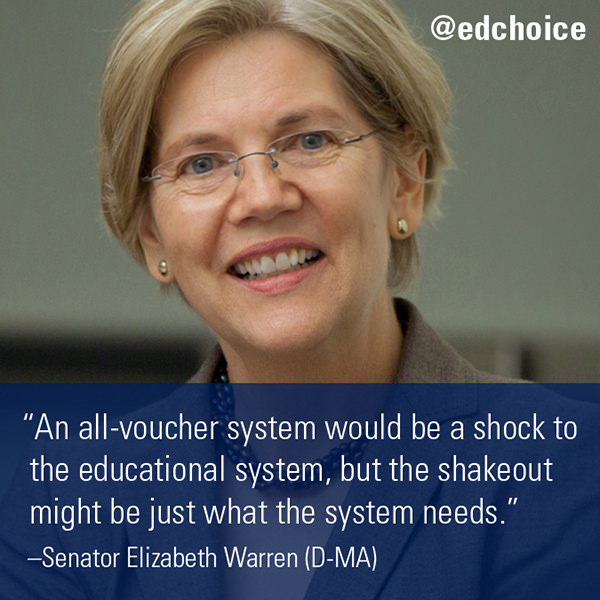Friday Freakout: Are Private Schools Worth the Money?
Sen. Elizabeth Warren (D-MA) recently shared some school choice love, so we did as well—on our Facebook page:

Today’s freakout comes from someone who recognizes the very people universal public school choice could help, but still thinks choice is a fruitless effort. Here’s why in his own words:

Many people perceive private schools that way, and it’s not surprising that they do—private schools typically are depicted as “elite” in popular culture. Even many families, particularly those lacking vouchers or other forms of financial assistance, likely view their area private schools as “overly-expensive” compared with their “free” public school.
That said, we’d like to provide some much-needed context that will, we hope, change some minds.
Are Private Schools Too Expensive?
As we mentioned before, this is likely what many believe—and it’s understandable, particularly when comparing private tuition to the “free” alternatives (neighborhood public schools). Though we must keep in mind that public schools are not free. Parents and every taxpayer contributes to public schools’ per-pupil funding, which we’ll call tuition for comparison’s sake.
The national average per-pupil tuition for a child in public school is $13,041.
The national average per-pupil tuition for private schools is $8,549.
In addition, private School Review has a breakdown of the average private tuition cost by state here. The National Center for Education Statistics has spending data for public schools as well. Mr. Rogers and many skeptical parents will find that public schools’ per-pupil tuition in most states is actually rather high. Averages give us a general picture, but even they can be misleading. So we decided to act as a parent might, and look at some local competing public and private schools to see which is technically more expensive than the other.
Gary, Indiana
Public: Daniel Webster Elementary School
The total spending per-pupil in Gary Community School Corporation is $14,284.
Private: Ambassador Christian Academy
Tuition is approximately $4,700, but the school leader works with families to find affordable payment options. The school also accepts school vouchers and helps parents through the application process.
Now that parents have a better picture, it’s clear to see why school vouchers can make sense for those whose children do better in private schools. With a voucher, those parents can get the education that fits their child best for less cost to taxpayers. What happens to the difference left over? That money remains with the public school, increasing funds per student who still attends the school. That’s more resources for the public students that might continue to struggle but, for whatever reason, don’t desire to utilize a school choice option. That’s what we call a win-win. The results of every fiscal study of private school choice programs in the U.S. can be found in our study of the same name A Win-Win Solution: The Empirical Evidence on School Choice.
Are Private Schools Becoming More Corrupt?
This is where Mr. Rogers has us stumped. There is no evidence of a trend of corruption increasing within the private sector of education. That’s not to say there aren’t stand-alone schools that experience some form of corruption; there are bound to be a few. What’s important, however, is the fact that the same can be said for public schools or any other type of school.
For instance, a Public Agenda report called “Rolling Up Their Sleeves: Superintendents and Principals Talk about What’s Needed to Fix Public Schools,” 82 percent of superintendents said politics and bureaucracy were the top reasons colleagues left their field; 49 percent of principals said the same thing. Imagine if politics didn’t determine an educator’s fate but, rather, their ability to satisfy the families they serve.
Are Private Schools Underachieving?
We know from 12 random-assignment studies no students using school choice vouchers declined academically after switching from their public schools to their private schools of choice. Eleven of those studies showed students’ achievements improved. One showed no test score change.
In addition to test scores, which can be revealing, graduation rates, college acceptance rates, and rates of persistence in college are critically important. Here are a few results researchers have found with respect to school choice:
- Washington D.C.’s voucher program increased students’ probability of graduating by 21 percentage points.
- Milwaukee’s voucher program raises the likelihood of a student graduating, enrolling in a four-year college, and persisting in college by 4-7 percentage points.
- Children who received a voucher in New York City are 25 percent more likely to go to college.
In the end, if we step back to take a look at the big picture, we’ll see that it’s pointless to get into a battle of “this sector’s schools are better than that sector’s schools.” Why? Because the same way there are great- and poor-performing public schools, there are also great- and poor-performing private schools.
What matters most is providing every option possible to parents to ensure their children are not poor-performing students in any school. Through an “all-voucher,” all-ESA, or some other type of universal school choice system, we can maximize those opportunities and, per Sen. Warren’s point, “shakeout” the education system, public and private.




